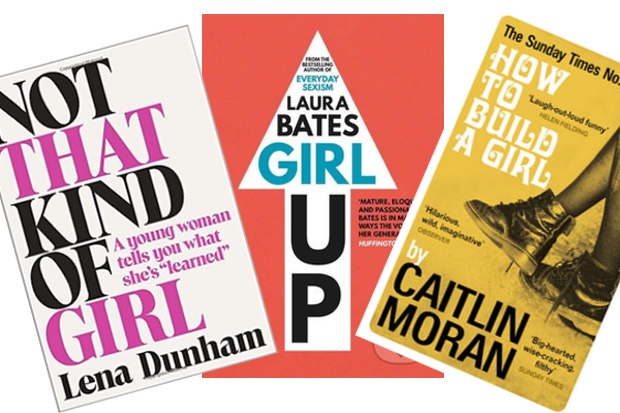Another day, another instruction manual is published on how to be female. ‘Girl Up’ by Laura Bates, author of ‘Everyday Sexism’, is out this week. It is intended to be a handy guide for women on all the ‘lies they told us’. Who are they? ‘They’ means anyone who disagrees with the contemporary feminist line: that women are weak, vulnerable and oppressed.
But ‘Girl Up’ is merely the latest instalment in a series of feminist manuals. It began in 2011 when Caitlin Moran – the world’s most annoying woman – published ‘How To Be a Woman’. Ever since, media savvy feminists have continued to reel out book after book of female instruction manuals.
‘Not That Kind of Girl’ by Lena Dunham followed in 2014. In the same year, Moran came up with a new manual with ‘How To Build a Girl’. In 2015, Caroline Criado-Perez brought out ‘Do It Like a Woman’, and now, Laura Bates brings us her second instalment of rules for women in ‘Girl Up’.
All of these books tell women how to behave. Dunham’s book, much like Laurie Penny’s ‘Unspeakable Things’ is a quasi-autobiography which outlines all the things she did wrong – and all the lessons we the ignorant female reader should learn from her. Moran’s affected obviousness and Criado-Perez’s creepy friendliness take a more direct approach: this is how you should act, because, as a fellow female, I should know.
But the uncomfortable truth for all these semi-authors is that these books are exactly the same. A fact they want to hear even less is that they’re all written by middle-class, white journalists. It’s almost as if they decided to club together to create a whole new genre on middle-class feminism.
That this should make most women balk is an understatement. Not merely for the fact that the authors come from a specific background, but because these books prescribe the specific way of life and political outlook of that background. The politics that these how-to manuals dictate is one in which to be ‘woman’ is to be vulnerable, under threat, in need of therapy and, ultimately, a victim.
Since second-wave feminism moved towards being a white-girls’ sorority club and turned its attention to bodyweight, make-up and the ethereal notion of ‘the patriarchy’, these types of writers have consciously ignored class and a deeper criticism of why capitalism sets women back. In doing so, they made feminism cultural; a movement which defined how women felt and how they appeared in society instead of asking what women wanted from society or how best to liberate women materially.
Every single one of these books is about body issues, clothing choices, boyfriends, how to have sex the right way and how to ‘raise awareness’ about women’s suffering. In the same breath that they scorn Cosmopolitan or Glamour magazine for running how-to’s on what to wear, how to lose weight or what blusher suits you best, they champion their own instruction manuals. But while glossy magazines give practical, if a little silly, advice on how to shed a few pounds or chose the right jeans, these feminist manuals seek to instruct us on the way we should think, how we should see ourselves and, most terrifyingly, what kind of politics we should engage in.
You can’t encapsulate ‘womanhood’. It isn’t something you can bottle up and sell. And you can’t write a book about how to be the right kind of woman – especially if you belong to a middle-class, out of touch, media elite. Women should be defined by the actions they take, the things they say and their contribution to society.
The authors of these books, and many other contemporary feminists, deny women their autonomy. They suggest that it is more important for us to retreat from public life than to demand what we want from it. They see women as under threat from rape culture, oppressed from birth by gender conformity and held back in life by a society run by men. The truth is much less conspiratorial: women in the West have never had it so good. But we still lack freedom over our bodily autonomy, to choose when we want to give birth or decide how and when we want to raise children. These are material issues women must fight for using their political autonomy. If we take our cue from middle-class whinge-bags in search of the next big book deal, we’ll never get anywhere.
Ella Whelan is assistant editor at Spiked.






Comments